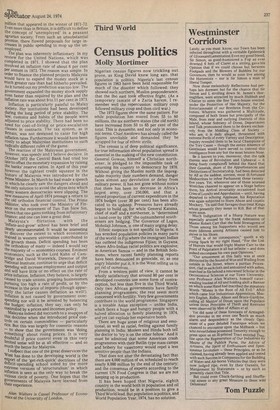Census politics
Molly Mortimer
Nigerian census figures now trickling out prove, as King David knew long ago, that population is politics. Nigeria's last census
figures in 1963 have been held responsible for much of the disaster which followed: they showed such northern, Muslim preponderance, that the Ibo east took effective fright. (As a temporary inmate of a Zaria harem, I remember well the repercussion: military coup followed military coup and then civil war.)
The 1973 figures show the same pattern. For while population has soared from 55 to 80 millions, the six northern states (the old north) have increased from 53 to 65 per cent of the total. This is dynamite, and not only in economic terms. Chief Awolowo has already called the figures unreliable and demanded they be scrapped for fear of ethnic strife.
The census is of deep political significance, for true information about population spread is essential in the making of the new constitution. General Gowon, himself a Christian northerner, is pledged to the impossible task of returning his country to democracy by 1976. Without giving the Muslim north the impregnable majority their numbers demand, danger faces almost any devolution or delay from military power. It has not gone without notice that there has been no decrease in Africa's largest army, over 250,000, and that a record proportion of current expenditure in the 1974 budget (over 30 per cent) has been allocated to its upkeep. Pressures have already begun to build up, for while General Katsina, chief of staff and a northerner, is "determined to hand over by 1976" the outnumbered southerners are hedging. The Governor of Lagos, Mobolaji Johnson, is one of many urging delay.
Ethnic suspicion is not specific to Nigeria; it has wrecked population policies in many parts of the world: in Fiji where the immigrant Indian has outbred the indigenous Fijian; in Guyana, where Afro-Indian racial politics are explosive; in American Samoa — and in the British Solomons, where recent family planning reports have been denounced as genocide, or, as one angry Islander put it, it is the West telling us to get rid of ourselves. From a western point of view, it cannot be wholly satisfactory that around 80 per cent in developed countries use some form of contraception, but less than five in the Third World. Only two African governments have family planning programmes; the rest seem more concerned with fertility. Very few governments contribute to the world programme. Singapore is a notable Asian exception — unlike India, which faces a huge and hungry people with a halved allocation to family planning in 1974, and yet can explode her expensive bomb.
There are huge areas of religious and emotional, as well as racial, feeling against family planning in India: Moslem and Hindu both tell the doctor to 'try it on the other fellow.' And it must be admitted that some American crash programmes with their Butlin-type mass camps and bribery for vasectomy would repel a less sensitive people than the Indians.
That does not alter the devastating fact that there are 4,000 million of us, scheduled to reach nearly 8,000 million by the end of the century; and the consensus of.experts according to the current UN Food Congress is that we are not keeping up in production. It has been hoped that Nigeria, eighth country in the world both in population and oil production, would be in a position to give a Third World lead. But population is politics, and World Population Year, 1974, has no solution.


































 Previous page
Previous page